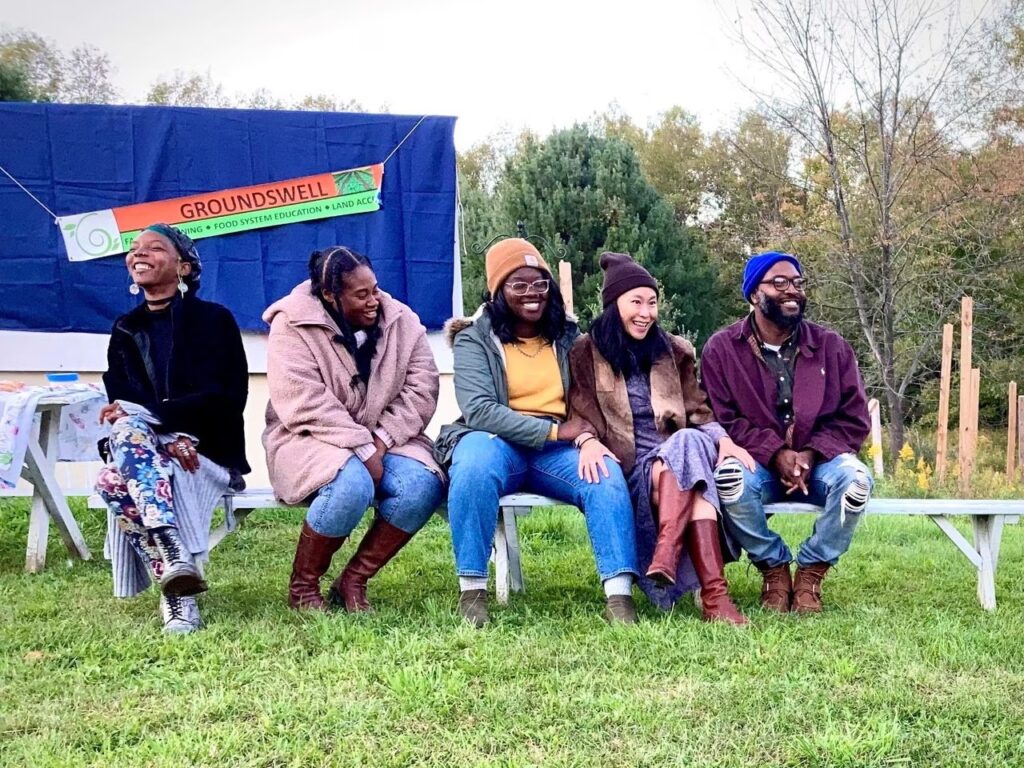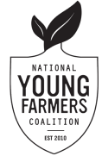Charles Madlock is a Land Advocacy Fellow with Young Farmers and an urban farmer in Syracuse, New York at Golden Carat Farms. His op-ed was first published at Syracuse.com in March 2023.
Only 1.4 percent of farmers in America are Black. In New York state there are only 139 Black farmers. At first, my family did not take my endeavor to become an urban farmer seriously, but what started as a mission to prove them wrong transformed me from a graphic designer into a farmer advocate. For me, farming gave me something concrete that I could take back to my community that wasn’t just me saying that I wanted to fight for change, but actually making change in material ways. Agriculture is a learning tool that teaches patience and builds confidence. It is also integral to people’s day-to-day lives. My long-term goal is to use urban agriculture as a means to create other programs that redistribute wealth and cultivate more food sovereignty in my community. The 2023 farm bill is a critical opportunity to implement policy that supports small farmers like me in improving our food systems for the long haul.
I am committed to expanding access to fresh and healthy food for low-income residents. As a farmer advocate, I aim to promote the development of local food systems infrastructure and support local farmers as a way to improve the regional economy.
I got my start with farming in February 2021, through Groundswell’s BIPOC Beginner Training Program in Ithaca. While there, I got the opportunity to visit a nonprofit organization named Volunteers Improving Neighborhood Environments (VINES) in Binghamton. VINES empowers people to improve their lives and communities through urban gardening and connecting urban consumers to rural farmers. They manage 22 community gardens, an urban farm and the Binghamton Farm Share Program. I was inspired, and impressed, by the various volunteer garden leaders we met and the community gardens we visited. It was then that I began to see a future for myself in farming.
I currently serve as the Urban Agriculture Coordinator at Refugee and Immigrant Self Empowerment (RISE), a nonprofit organization that offers various services to refugees and immigrants resettled into the Syracuse area. I oversee a community container grow program and home garden program. I also manage three community gardens with a total of 45 raised-bed plots. We have about 24 gardeners that grow culturally relevant foods native to their homeland.
While Syracuse is home to the longest-running state fair in the country and the largest farmer’s market in New York state, over 50% of census tracts in Syracuse are classified as food deserts. A food desert is an area that has limited access to affordable and nutritious food. Food deserts are generally in low-income areas that are at least one mile — and in rural areas, up to 20 miles — from a large grocery store.

Food deserts are a glaring symptom of a larger, nationwide issue: We are living within an unsustainable food system, one controlled by big agriculture, at the expense of the health and well-being of the people. When I talk to people about the lack of access to food in Syracuse, I often receive suggestions like “more grocery stores, more farmers markets, and more food pantries.” But these suggestions do not get at the root of the problem: The current system is broken by design.
In my short tenure as a farmer, I have learned that the support of the local community is critical to boosting local food security, local economies and reducing reliance on imports. With all the uncertainties of the world currently, including inflation being at a 40-year high, it is important for everyone to consider the importance of agriculture, and the role of small, young farmers in particular.
The current generation of farmers is aging out of the profession while prime farmland is being lost to development at a rate of more than 2,000 acres per day. Over the next 20 years of my life, nearly half of U.S. farmland is expected to change hands. The biggest problem beginning farmers face is not only the lack of access to good land, but also to a viable market.
As a small farmer, if I wanted to sell my crops to my local grocery store, I would have to sell at a loss. The USDA dictates the price of crops in supermarkets. Big-box retailers routinely sell their produce at up to a 45% loss, which for them is no big deal because they know they can make up that difference. Meanwhile, my margins are so tight I need every penny, and that business model isn’t sustainable.
Farmer’s markets, on the other hand, while easier to access for smaller farmers, provide a very narrow market. Not only is it difficult to haul my crops to the farmer’s market after a long, physically demanding week of field work, but I still am not putting food into the hands of the community that I want to serve. Lack of transportation and lack of education are major accessibility barriers for low-income people.
Fostering taxpayer-funded Community Supported Agriculture programs could revolutionize agriculture and rebuild communities simultaneously. CSA is a production and marketing model whereby consumers buy shares of a farm’s harvest in advance. Two great examples of this model being used to address food insecurity is Healthy Food For All in Ithaca and VINES Farm Share program in Binghamton. CSA programs, paired with urban agriculture education, provide healthy food in a way that reduces the energy cost of food production while helping people understand their role in the food system and the importance of farming.
I started my company, Golden Carat Farm, as a solution to challenges faced by farmers like me. Instead of taking the traditional route of seeking out land to buy first, and potentially going into insurmountable debt, I am prioritizing networking and relationships by being an urban agriculture educator so that I can identify clear channels for selling my food down the line. Part of my role is encouraging and facilitating small business development and providing opportunities for skill and employment training in my community.
“Planting seeds, growing community” is the tagline I use for my business. Through farming, we are investing time and energy into seeds of nourishment and education. Instead of just growing food, we’re growing community. We should urge our federal legislators to increase funding available for programs that connect low-income communities to nutritious, culturally appropriate foods sourced from local farmers, especially those operating on a small scale.
As a Land Advocacy Fellow with Young Farmers’ One Million Acres for the Future campaign, I am asking my members of Congress to pass a 2023 Farm Bill that makes a historic investment in equitable land access and continues to plant seeds for community nourishment and education. Specifically, I am calling on Congress to:
- Distribute funding directly to community-led projects that meet the needs of small, local farmers and underserved consumers. Specifically, subsidize CSA programs to support young and beginning farmers in accessing broader local markets.
- Ensure USDA land-related programs are accessible, appropriate and accountable to young farmers and farmers of color. Specifically, implement an urban agriculture program that actually has the capacity to serve urban growers, and invest in USDA programs that incentivize local municipalities to allocate land for urban agriculture.
- Invest in student loan forgiveness for beginning farmers.
- Prevent land loss in communities of color, particularly at the time of farm transition.
- Support buy-protect-sell programs so that urban and rural farmers can have secure short-, medium- and long-term land access opportunities. In urban areas, invest in building community gardens as a means of feeding and employing residents in the community while resisting gentrification.
By addressing both land access and food insecurity in the 2023 Farm Bill, we can radically transform the future of our food and agriculture systems. All of our voices are important in calling on Congress to create a 2023 Farm Bill that supports young farmers. To get involved with the campaign and receive action alerts, sign up here: p2a.co/land.
